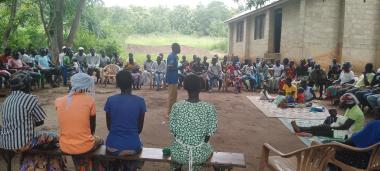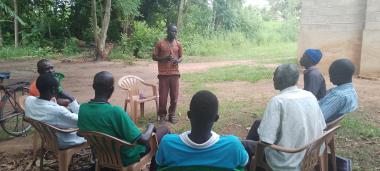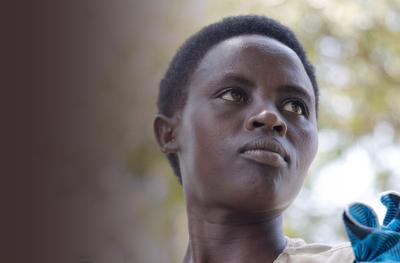
My name is Stephen Batali. I am 35 years old, a farmer, and married with five children. I live in Mugwo Payam, Yei River County, South Sudan. Reflecting on my past, I struggled with my emotions. I wasn’t a calm person; I was violent. I often responded to disagreements with anger and violence, particularly towards my wife. In those moments, I would beat her and threaten anyone who tried to interfere in our family matters or help her. I was not fulfilling my role as a provider, leaving my wife to take care of our children and meet their needs on her own.
One day, our community leader approached me and informed me about Women for Women International’s Men’s Engagement Program (MEP). At first, I was skeptical; I thought they were going to blame the men for all the violence, and I was prepared to defend myself. However, that was not the case. We were not judged but rather invited to have open conversations around gender equality, women's rights, positive masculinity, responsibility, and violence. For the first time, I was compelled to confront the impact of my actions, words, and silence in creating a safer community for women.
After the training, I realized how deeply my actions affected our family. It has been a journey of learning and growth for me, and I am committed to being a better partner and father. I have become a good example by improving the living conditions in my home. I paid my children’s school fees, provided food, clothing, and medication, and assisted my wife with household chores. These changes have improved our communication and strengthened our relationship.
I grew up with strong traditional beliefs about masculinity, power, and gender roles. We rarely discussed sexual violence and gender equality. These topics were considered taboo in our culture, and some even joked about them, treating them as a laughing matter. However, my growing concern about the ongoing cases of sexual violence in my community pushed me to advocate and raise awareness. Through training sessions, couple dialogues, role plays, and radio programs, I learned what it means to be a man in society. The program helped us explore how cultural norms normalize sexual violence and how silence, ignorance, or indifference make people complicit.
With the rise of conflict and political tension in different parts of South Sudan, cases of sexual violence and abductions were on the rise, especially in Yei River County. In 2017, a close relative was raped in my neighborhood, and the incident left me thinking about all those women who had been violated and abused and that no one was doing anything about it. As part of the MEP training, I also participated in community dialogues where other men from my community participated. In those sessions, I came across men who viewed sexual violence as a normal act and were reluctant to discuss it. Some men avoided the topic altogether because their culture considered it taboo, which limited support from the community. This experience made me realize the urgent need to act against sexual violence.
Since then, I have been working alongside fellow graduates to train and raise awareness among men and boys about sexual violence and how to prevent it. We do this in churches and public areas in Longamere village. While we see some positive behavior change, men still exhibit mixed reactions when discussing sexual violence. Some are open and receptive to the conversation, while others resist addressing the issue.
I have also been trained in psychosocial first aid and safe referrals for survivors. This enables me to provide immediate support and guide survivors to the necessary services. To ensure a survivor-centered approach, I let survivors choose their next steps after explaining their options. I also work with other women to help survivors feel comfortable sharing their experiences.
I treat women and girls with respect and aim to set a positive example for men by challenging negative comments about women and sexual violence.
Through my advocacy efforts, I have trained many men in the prevention and response to sexual violence. I feel that my work is contributing to a shift in attitudes in Longamere village. Reports of sexual violence have decreased, and more survivors are coming forward to seek support and justice. Change takes time, but every time a man tells me that he has changed how he treats women for the better, I know we are making progress.


